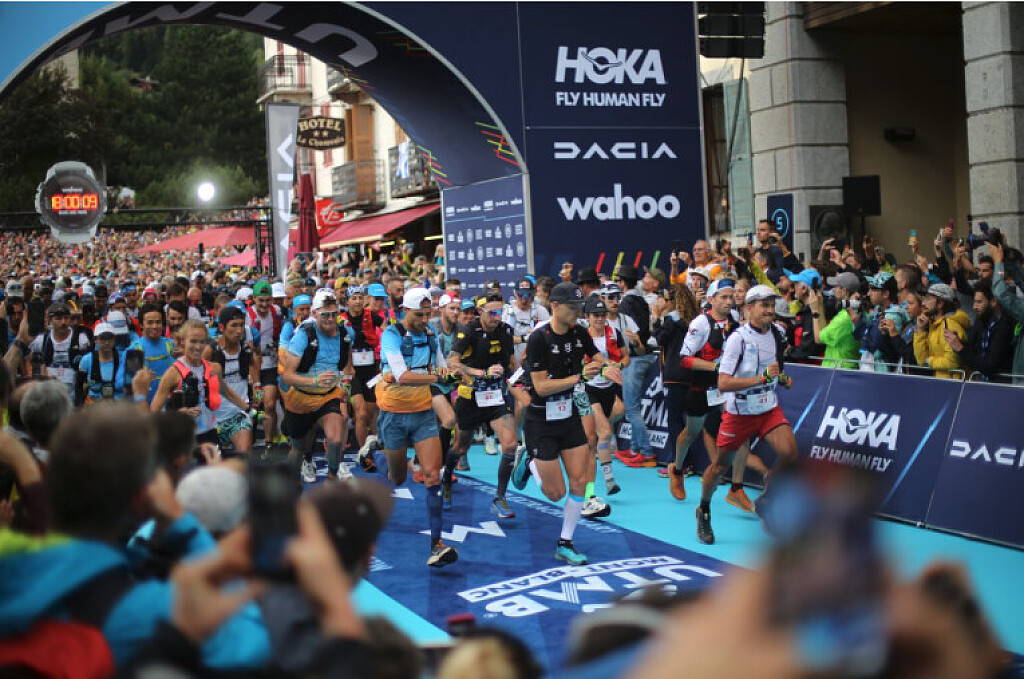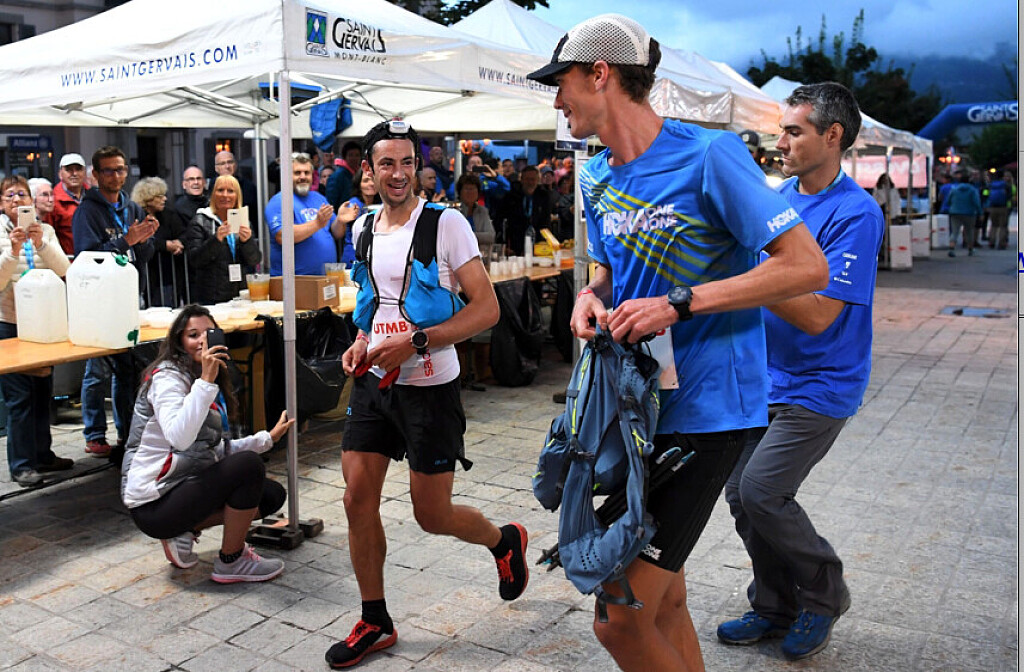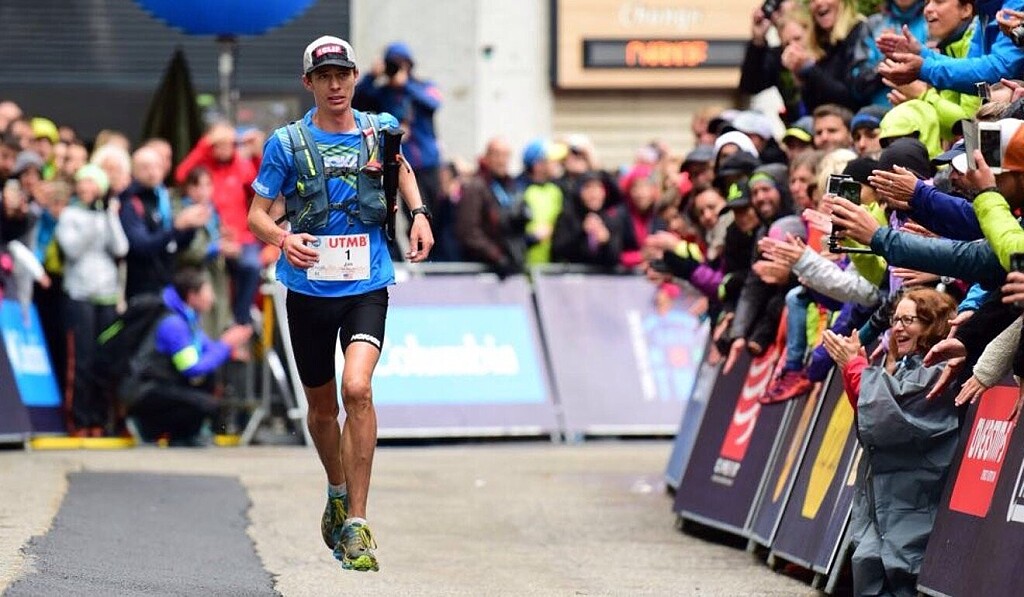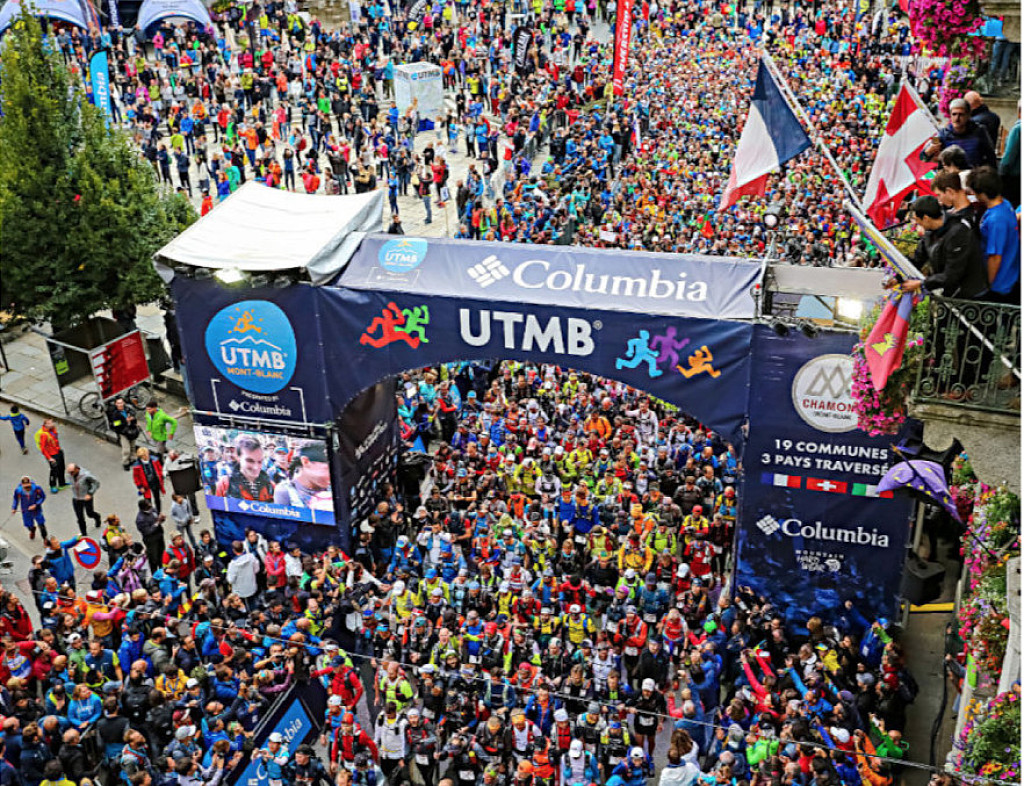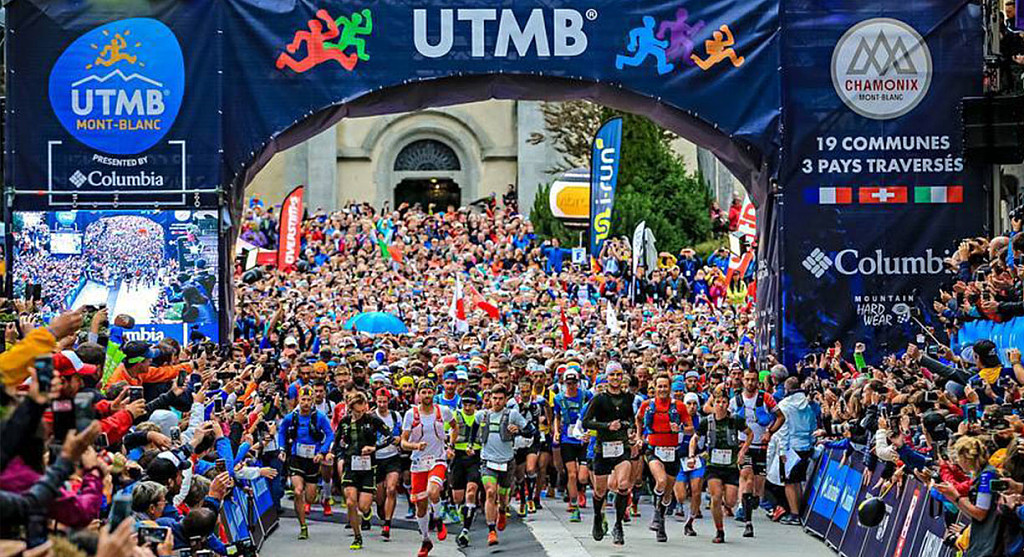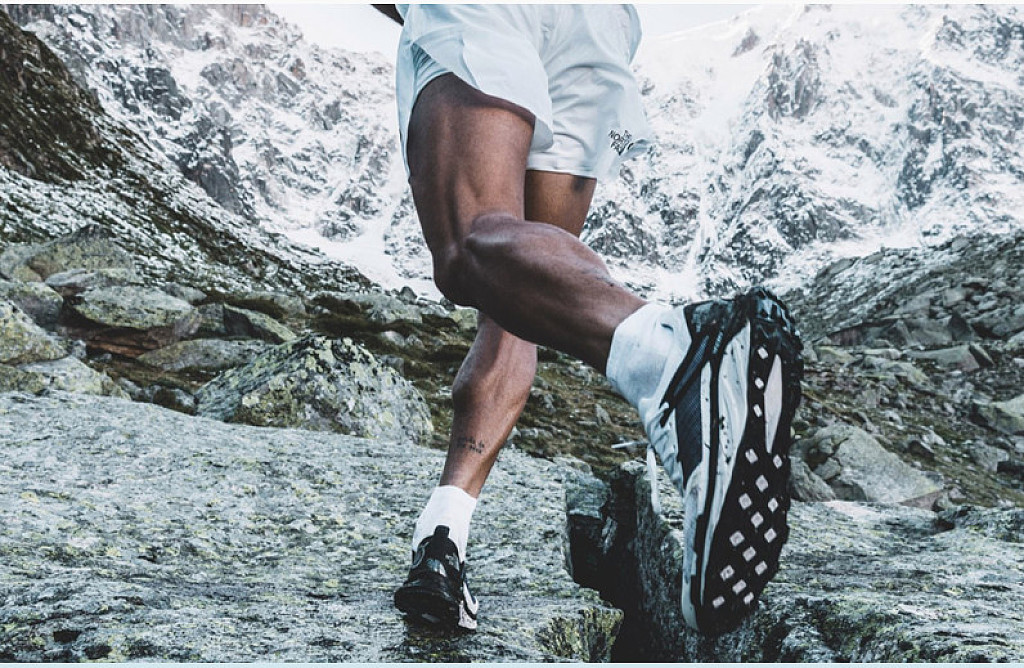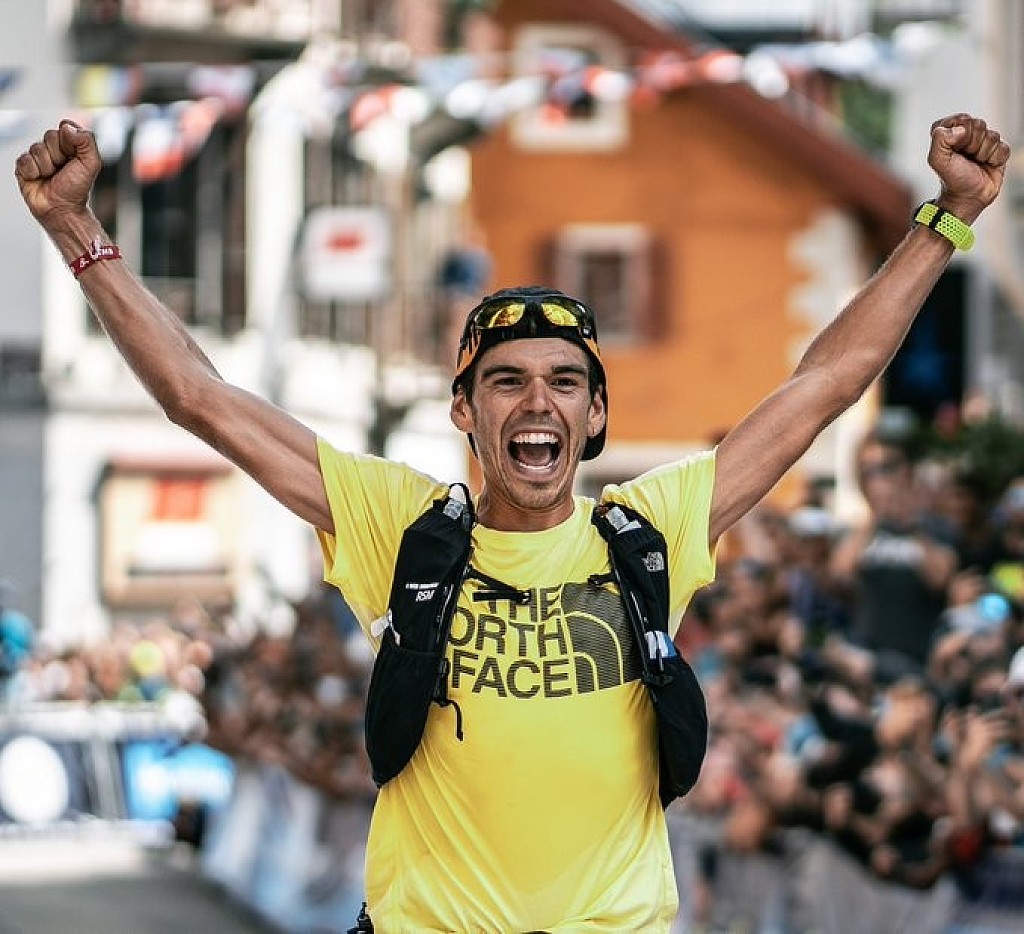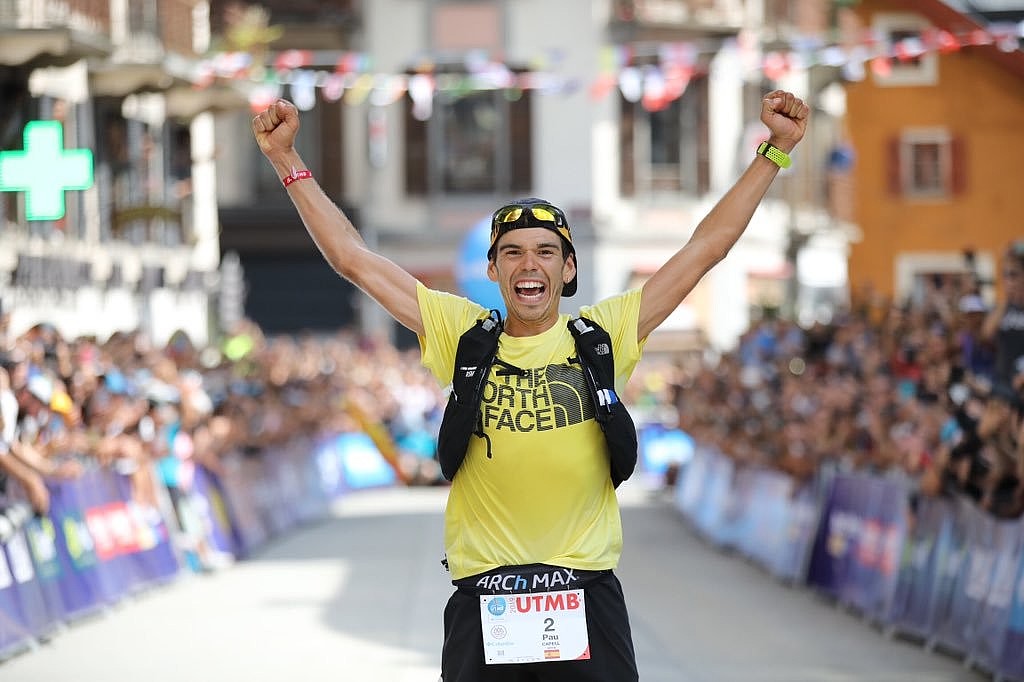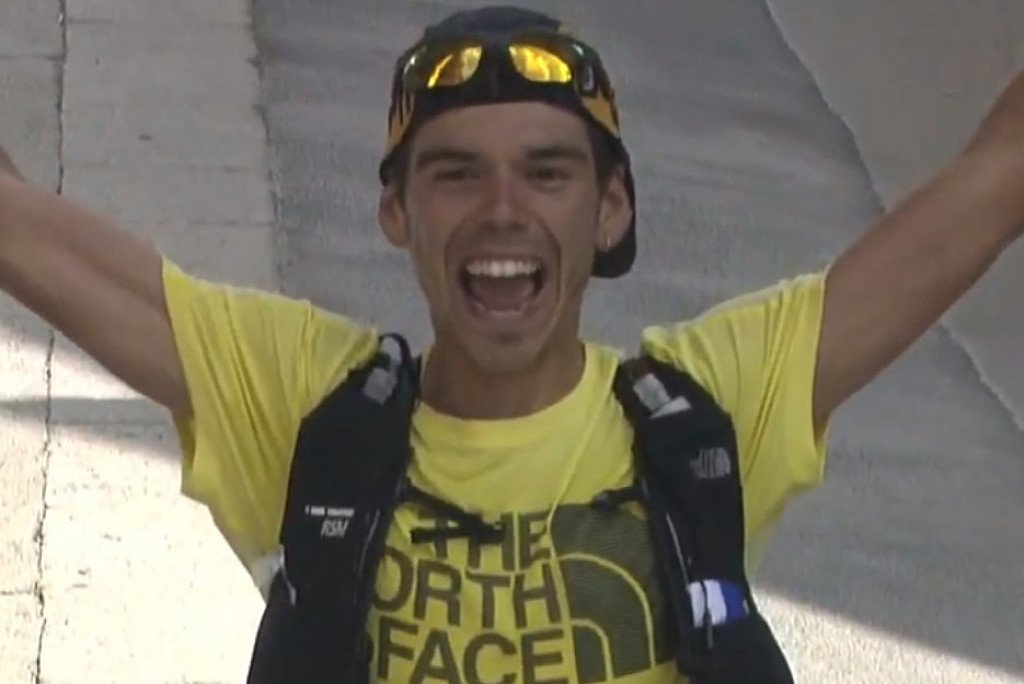Running News Daily
Running News Daily is edited by Bob Anderson. Send your news items to bob@mybestruns.com Advertising opportunities available. Train the Kenyan Way at KATA Kenya and Portugal owned and operated by Bob Anderson. Be sure to catch our movie A Long Run the movie KATA Running Camps and KATA Potato Farms - 31 now open in Kenya! https://kata.ke/
Index to Daily Posts · Sign Up For Updates · Run The World Feed
Articles tagged #Pau Capell
Today's Running News
2022 UTMB Men’s Race
As expected, the men took the race out fast from the start on the relatively flat roads and trails from Chamonix to the village of Les Houches. Spain’s Pau Capell, the 2019 UTMB winner, led a charging group through Les Houches, seven kilometers into the race, followed closely by Mathieu Blanchard, a Frenchman living in Canada, and Jia-Ju Zhao and Guo-Min Deng, both of China. All the top contenders were in a massive chase pack, settling in for the long night and day ahead.
It didn’t take long for Jim Walmsley (pre-race interview) of the USA to make his intentions for this year’s race clear, coming into Saint-Gervais, at 20 kilometers into the race, in the lead, looking strong and relaxed. Kilian Jornet and Capell were just seconds behind with Deng, Zhao, and American Zach Miller making up a chase group half a minute in arrears. They were followed by Frenchman Germain Grangier, Blanchard, Frenchman Thibaut Garrivier, and Yan-Qiao Yun of China.
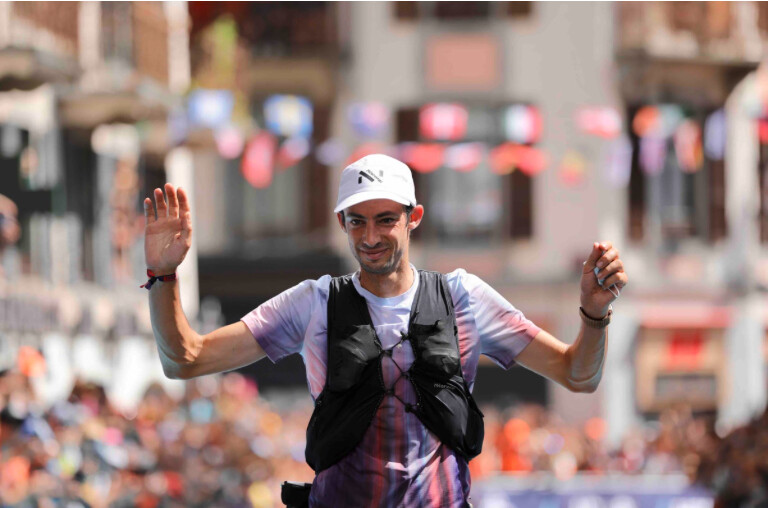
Unsurprisingly, by Les Contamines, 31 kilometers into the race, it was shaping up to be a showdown between Walmsley and Jornet. They came into the aid station together looking relaxed, Walmsley taking the time to high-five fans, and were shortly on their way into the night together. Capell and Miller came in just 30 seconds back, and Grangier rounded out the top five, just a minute behind them.
A notable withdrawal around this time due to physical issues is last year’s second place finisher, Frenchman Aurélien Dunand-Pallaz (pre-race interview).
Climbing over the high Col du Bonhomme, 43 kilometers in, Walmsley, Miller, Jornet, and Tom Evans (pre-race interview) of the U.K. shared the lead. With 1,160 meters (3,800 feet) of climbing down just on this one climb, everyone in the group looked relaxed and was moving well. Capell was just 90 seconds back, trying not to let the elastic to the front group snap in the dark of the night on the run over to Col du Bonhomme before the long descent into the remote French outpost of Les Chapieux.
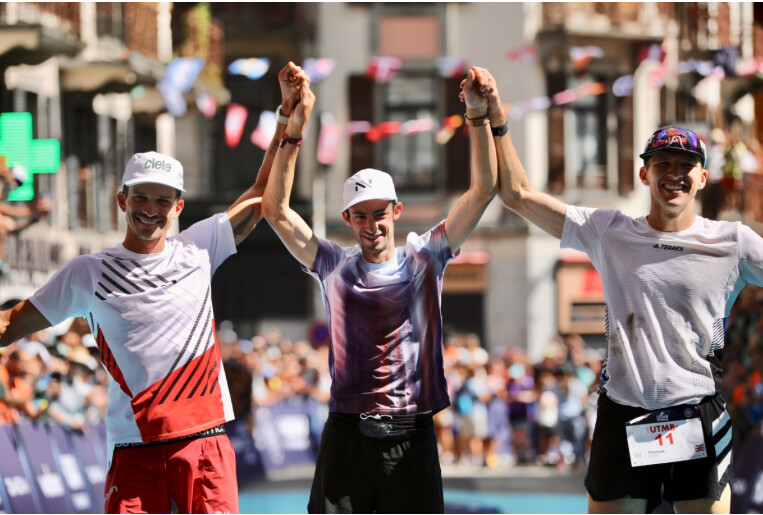
The four leaders stayed together down to Les Chapieux, 50 kilometers into the race, where last year’s winner, François D’Haene — not participating this year — was spectating and cheering on runners. Unfortunately, Capell had lost contact with the lead group over the previous section, coming into the aid station more than two minutes back. The rest of the top nine stayed relatively the same with Erik Sorenson of the USA slotting in 10th for the first time.Coming into Lac Combal, 66 kilometers into the race, after crossing country borders into Italy and traversing the most remote part of the course, Walmsley and Jornet had only slightly pulled away, their gap to Miller and Evans hung at a tenuous minute. All four looked strong, but it seemed like pre-race predictions of a two-man showdown were about to be realized.
Walmsley, with his arms and legs fully covered from the cold of the night but shirt front open, came into the town of Courmayeur, 80 kilometers in, solo and in the lead, but his gap on Jornet just 80 seconds.
Both men were moving well and left the aid station together after only a few minutes. It was a significant 12 minutes before Evans and Miller came through, staying in Courmayeur for under three minutes. Blanchard, looking more relaxed than any of the previous four, was also in and out of the aid station quickly, 18 minutes off the lead. Known for his slower starts and late race surges, Blanchard appeared to know exactly what he was doing.
It was never a question of if Walmsley or Jornet would strike out on their own, it was just a matter of when. Walmsley was the first to throw down a serious acceleration, coming into Arnouvaz (97 kilometers) solo and with a 2.5-minute gap on Jornet. Both were in and out of the aid station quickly, looking strong and motivated. Blanchard also chose the trail between Courmayeur and Arnouvaz to make his move, coming into the Arnouvaz aid station in third, looking very controlled and 14 minutes behind the leaders.
He was familiar with that position in the race, having finished third in UTMB in 2021. He was also familiar with the race tactic of starting slower, letting the leaders fight it out early and tire themselves out, and then moving up as the fast starters dropped back. It had brought him success the previous year, and he was seemingly employing the strategy again. Miller and Evans continued to run near each other, what Evans would later refer to as a “bromance” that lasted over half the race, and both looked like they had less spring in their step than the men ahead of them.
Committed to making the move stick, Walmsley climbed the Grand Col Ferret at 102 kilometers with a strong powerhike and held a five-minute gap over Jornet. Seemingly unconcerned with his position, Jornet chatted in French with both spectators and volunteers before vanishing into the night. Moving faster and looking stronger over the col than the previous two men, Blanchard continued the chase in third 17 minutes back. Miller and Evans continued to work together to keep the gap manageable.
The gap between Walmsley and Jornet stretched even further to 14 minutes by the sleepy Swiss village of La Fouly, 112 kilometers into the race. Both men were running under course-record pace, and both looked calm and collected. Still running strong into La Fouly, Blanchard kept the leaders within reach.
But Walmsley was committed to stretching the elastic on the field as much as he could, coming through Champex-Lac at 125 kilometers with 13 hours and 40 minutes on the race clock, gaining even more time on the course record and moving strongly. It’s generally a bad idea to bet against Walmsley after he’s put his mind to something, and after a fifth place finish in 2017 and DNF in 2018 and 2021 at UTMB, his commitment to the race and move to Europe to train on the trails seemed to be paying off.
But Walmsley is also known for going out fast and strong, and it doesn’t always stick.One could argue that Jornet was just biding his time, letting Walmsley burn his matches out front. However, there were times around this point in the race where Jornet just plain looked like he was working, enough so that we all began to wonder if the GOAT of trail running would have a crack in his armor today. However, by Trient at 142 kilometers, Jornet had decided to make his move, coming into the aid station in the lead. But instead of seeing Walmsley behind him, it was a surging Blanchard, less than a minute back that Jornet would have to now battle.
It was a long 19 minutes before Walmsley would arrive, appearing to be in discomfort. The dynamic duo of Evans and Miller continued to run together, still holding the gap to the race leader at just over 30 minutes, as they had for much of the race.As the kilometers ticked down, it was indeed a showdown between two men, except it was Blanchard challenging Jornet, with both men coming into Vallorcine at 153 kilometers together, well ahead of the course-record pace.
With Walmsley slowly losing time to the leaders but still in third, eyes moved to Evans who’d finally dropped Miller after nearly a night and a day of racing side by side to see if he could make the pass.By this time, it felt nearly inevitable that Jornet would run to the win and it was no surprise when he came into Tete aux Vents solo looking focused and fast with an 11-kilometer downhill run to the finish. Blanchard never gave up the chase, seven minutes back, while Evans passed a tired but “pumped” Walmsley to slot into third for the first time.
Jornet would finish with a course-record time of 19:49:30, besting both François D’Haene’s 2014 record time (20:11:44) on a course which did not include the Pyramides Calcaires, a gnarly little climb and descent added to the UTMB course a few years back, and Capell’s 2019 time (20:19:09), which did include those extra kilometers.
This is his fourth win at UTMB. Just five minutes back, Blanchard would also come into the finishing chute under the previous course record in second place. An elated Evans rounded out the podium, a stellar finish for his first UTMB.
Walmsley came across the line in fourth, releasing the two DNF monkeys on his back and finishing the next step in his goal of ultimately winning this race someday. Miller, no longer on the comeback trail following surgery and recovery, but fully back, crossed the line in fifth place.
Most of the back half of the men’s top 10 are runners who started slower and bided their time, moving up in the race’s second half, including France’s Beñat Marmissolle, France’s Arthur Joyeux-Bouillon,Jonas Russi of Switzerland, and Romania’s Robert Hajnal. The final member of the men’s top 10, however, is France’s Thibaut Garrivier, who went out hot and looked like he paid for it later, but ultimately holding onto 10th place.
Login to leave a comment
North Face Ultra Trail du Tour du Mont-Blanc
Mountain race, with numerous passages in high altitude (>2500m), in difficult weather conditions (night, wind, cold, rain or snow), that needs a very good training, adapted equipment and a real capacity of personal autonomy. It is 6:00pm and we are more or less 2300 people sharing the same dream carefully prepared over many months. Despite the incredible difficulty, we feel...
more...Will Jim Walmsley Be the First American Man to Win UTMB?
Jim Walmsley has always been an outlier among American trail runners.
Not only is he as fast and talented as any ultrarunner the U.S. has ever produced, but he's also been bold and even a little brash about his intentions. His off-the-front racing style is something to be revered-and respected if you're one of his competitors -because the lanky 32-year-old Hoka-sponsored runner from Flagstaff, Arizona, has proven time and time again that it works for him.
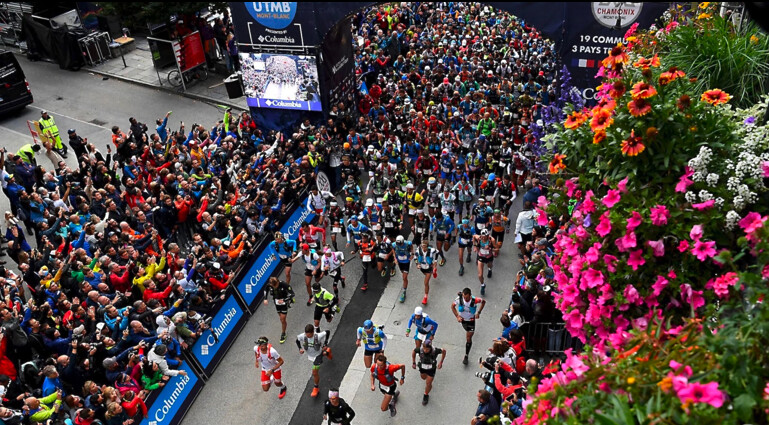
On August 26 in Chamonix, France, Walmsley will embark on his latest and most prodigious quest yet: to win Ultra-Trail du Mont-Blanc (UTMB). It's his fourth attempt at trying to follow up on his stated intention of becoming the first American man to win the race, but he's gone to extra lengths this year to prepare for it. It would certainly add to what has already been a great year, given that he and longtime girlfriend Jessica Brazeau got married on May 4 in Silverton, Colorado.
But if Walmsley is going to pull it off this year, he will have to fend off three-time UTMB winner and 2022 Hardrock champion Kilian Jornet, of Spain, among other strong runners in the talent-loaded field.
UTMB has been one of the pinnacle events in the sport of trail running since its inception in 2003. Not only does the course send runners on a grueling 171.5K loop (106.5 miles) around the Mont Blanc massif with nearly 33,000 feet of vertical gain, it also brings together the deepest international field of the year and more hype and media attention-including epic coverage and commentary via livestream-than any other event in the world by far.
One of several top-tier Americans in this year's UTMB field, Walmsley skipped the Western States 100 this year and since June has been living and training in the mountains of the Rhne Alpes region of France near Beaufort, not far from good friend Franois D'Haene, who knows a thing or two about training for big mountain ultras.
Last year, D'Haene not only became the first male runner to win UTMB for a fourth time, but he also became the first runner to win both Colorado's Hardrock 100 and UTMB in the same year.
The Frenchman was crewed and paced by Walmsley at Hardrock in 2021 and was one of the first people to suggest that Walmsley spend a summer training in the French Alps in order to best prepare for UTMB, rather than showing up in Chamonix 7-10 days before as he-and many other American men-have in the past.
Aside from Jornet, who won this year's Hardrock 100 for the fifth time on July 16, the top international runners include Frenchman Aurelien Dunand-Pallaz, the runner-up at UTMB last year; Germany's Hannes Namberger; New Zealand's Scott Hawker; and Spain's Pau Capell, who won the race in 2019.
D'Haene certainly thinks Walmsley is capable of winning UTMB, but points out that there are always numerous capable runners who are contenders and it all depends on how the race plays out. The idea of Walmsley stating his intent out front-that he wants to win UTMB-is more of a bold American approach, D'Haene says, as opposed to a more subtle European style he prefers.
"Just to explain to people, 'I am here to be the first American to win the UTMB,' puts a lot of pressure on him," D'Haene says. "He thinks UTMB, he sleeps UTMB, he eats UTMB, so it's a lot of pressure. If you take the approach that I just want to smash that course and win that race, then it's a lot of pressure. I'm not sure if he'll win or not win, but at least he's training well in the Alps and his confidence is up."
Walmsley has raced UTMB three times already-taking fifth in 2017 but DNF-ing in 2018 and 2021. The fact that no American man has ever won UTMB is irrelevant in the scope of this year's race, but it certainly adds a heightened focus in Walmsley's quest and a brighter spotlight on him before and during the race.
Whereas four American women have won the women's UTMB race a total of seven times-including the 2019 and 2021 champion Courtney Dauwalter-only a handful of U.S. men have made it to the UTMB podium. The highest finish came when when Topher Gaylord and Bradon Sybrowsky tied for second in the inaugural race in 2003.
While Walmsley appears to be the top American this year, it would be foolish to focus on him as the only American capable of winning. Other U.S. runners with momentum and motivation heading into UTMB include Tim Tollefson, who finished second at CCC in 2015 and third in UTMB in 2016 and 2017; Tyler Green, fourth at Western States 100 this year and 10th in the TDS 145K in Chamonix last year; Zach Miller, winner of the CCC 100K in 2015 and sixth and ninth, respectively, in UTMB in 2016 and 2017.
Miller went for broke trying to win UTMB in 2016 and held a 35-minute lead beyond the halfway point. He still led at the 100K mark, only to struggle over the final 50K and wind up sixth. What makes UTMB different, he says, is that the endless string of long climbs and descents demands a more moderate rhythm and effort over the first half of the course so you don't blow up before the race really begins.
"I don't think there's a super-secret code to crack. We've had a number of really good American men run there, it's just we have to have one of them have a good day all day one of these years," Miller says. "It's not anything we can't figure out or accommodate for. I think we've done it in other European-style races. It's just this one has kind of eluded us. I think it's possible that someone is going to have that 'right' day, but you almost have to have to get a little lucky, too."
Tollfeson is coming off three DNFs at UTMB in 2018, 2019, and 2021, and had a tough Western States this year (21st). Miller also DNF'ed at UTMB in 2018 and 2019 and then was away from racing because of injuries. He finished his first long ultra in several years in late June, winning the Andorra 100K to earn his place in Chamonix.
Other Americans in the field include David Laney (third at UTMB in 2015), Jason Schlarb (fourth in 2014), Seth Swanson (fourth in 2015 and seventh at TDS last year) and Sage Canaday (48th at UTMB in 2017), who is back after suffering a pulmonary embolism and a devastating house fire in 2021.
As for Walmsley, his front-running style has helped him snag three Western States 100 titles, three JFK 50 wins, a 50-mile world-best time, a 100K American record and the Fastest Known Time running across the Grand Canyon and back. It also helped him produce a solid 2:15:05, 22nd-place effort at the 2020 U.S. Olympic Marathon Trials.
Most recently, he tore up the trails (and the competition) at the rough and rugged Madeira Island Ultra Trail 115K in Portugal in April. Otherwise is been running in the Beaufortain Mountains with D'Haene and training a lot on a Wahoo bike trainer in France. Two weeks ago, he completed the arduous 114K (71-mile) Ultra Tour du Beaufortain loop with 7,300 meters (25,000 feet) of vertical gain as one of his last big training days.
"I hope Jim can change it this year," D'Haene says. "I hope he will be OK and can run a good race, of course, but it's UTMB and, of course, it's always difficult."
by Trail Runner Magazine
Login to leave a comment
American Jim Walmsley will be taking another stab at UTMB
The 2022 edition of the Ultra-Trail du Mont-Blanc (UTMB) is seven months away, but the elite fields have been made official. Although he has never done better than fifth (and that was back in 2017), American Jim Walmsley will be gunning for a podium finish again on Aug. 28, along with seven of Canada’s top ultrarunners, including last year’s third-place finisher, Mathieu Blanchard. Check out the top athletes who will be racing this year.
UTMB — men
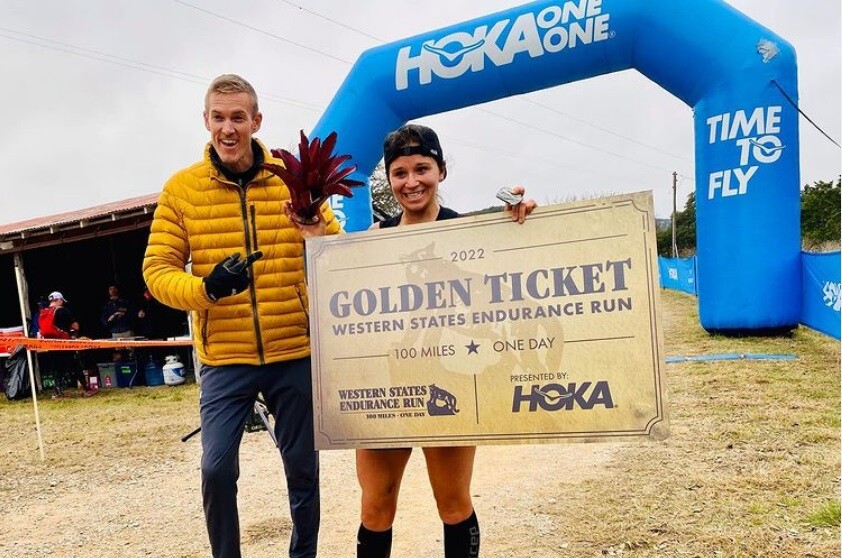
Blanchard, who is from France but lives and trains in Montreal, is among the top men who will be competing this year. Going into the race, Blanchard says his goal is to win the race, and he’ll have two main focuses for his training: “the first will be to prepare myself mentally, to visualize, to accept this possibility of a big goal because I still have trouble believing it today,” he says. “The second will be to build a logical race path to prepare for this race, choices of reason rather than choices of the heart.”
Last year’s second-place finisher, Aurélien Dunand-Pallaz of France will be returning, along with 2019 UTMB winner, Pau Capell of Spain. Walmsley, whose top finish was fifth in 2017 but who has won the Western States 100 for three consecutive years (2021, 2019, 2018) will also be challenging for a podium spot, as will France’s Xavier Thévenard, who has won UTMB three times (2018, 2015, 2013) and placed second in 2019. Nine other recent top-five finishers will also be joining them on the start line.
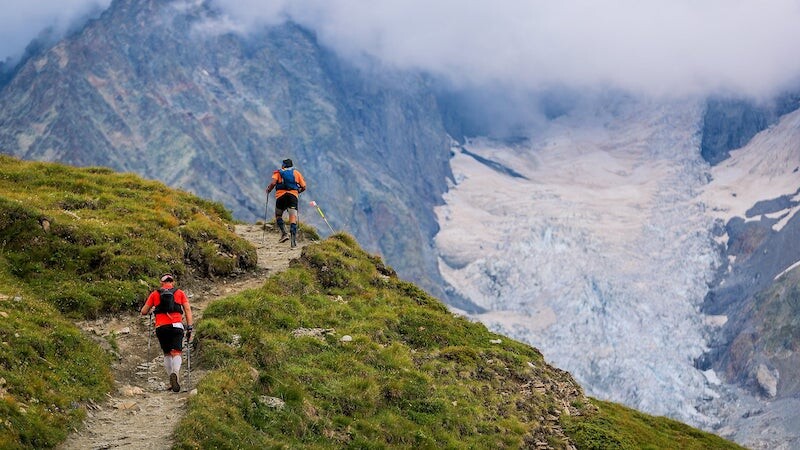
Notably absent from the start list is last year’s winner, François D’Haene and three-time UTMB champion, Kilian Jornet.
UTMB – women
Canadian ultrarunning fans will have plenty to cheer about in the women’s race in August. Three top Canadians will be on the start line, including Montreal’s Marianne Hogan, who won the 2022 Bandera 100K and placed second at the Ultra-Trail Cape Town 100k. Toronto’s Claire Heslop, Canada’s top finisher in 2021, will be joining Hogan, along with Alissa St. Laurent of Moutain View, Alta., who placed fifth in the 2018 UTMB TDS 145K in 2018 and sixth at UTMB in 2017.
“My dream result would be a top 10 at UTMB,” says Hogan, “so I will definitely shoot for that. A lot can happen come race day, so I will make sure to show up to the start line as ready as possible.”
Other top contenders on the women’s side include Camille Herron, who won the 2021 Javelina Jundred Mile (and broke the course record) in 2021 and set the 24-hour world record in 2019, Anna Troup, who won the 2021 Lakeland 100 Mile and the 2021 Spine Race Summer Edition 268 Mile, Sabrina Stanley, two-time winner of the Hardrock 100 and Beth Pascal, winner of last year’s Western States and two-time top-five finisher at UTMB.
There will be five other recent top-five finishers on the start line as well, but running fans will be disappointed to hear the two-time winner Courtney Dauwalter, 2019 third-place finisher Maite Maiora, among several other past winners, will not be in Chamonix on August 28.
CCC — women
There will be three elite Canadian women in the 100K CCC, including Victoria’s Catrin Jones, who placed in the top-10 at the 2019 Comrades Marathon 90k and holds the Canadian 50-mile and six-hour records. She will be joined by Ailsa MacDonald of St. Albert, Alta., who won the 2020 Tarawera 100 Mile and the Hoka One One Bandera 100K, and placed sixth in the CCC in 2019. Rounding out the Canadian squad will be Vancouver’s Kat Drew, who was third at the 2019 Bandera 100K, first at the Canyons 100K and eighth at Western States in 2019.
Other notable runners in the CCC include New Zealand’s Ruth Croft, who won the 2021 Grand Trail des Templiers 80k, placed second at the 2021 Western States 100 and won the UTMB 55K OCC in 2018 and 2019. France’s Blandine L’hirondel will also be looking to land on the podium after winning the OCC last year.
by Brittany Hambleton
Login to leave a comment
North Face Ultra Trail du Tour du Mont-Blanc
Mountain race, with numerous passages in high altitude (>2500m), in difficult weather conditions (night, wind, cold, rain or snow), that needs a very good training, adapted equipment and a real capacity of personal autonomy. It is 6:00pm and we are more or less 2300 people sharing the same dream carefully prepared over many months. Despite the incredible difficulty, we feel...
more...UTMB announces stacked fields for 2021 races
The 2021 edition of the Ultra-Trail du Mont-Blanc (UTMB) is still months away, but the fields for the August race are officially set. After UTMB organizers cancelled their event in 2020 due to COVID-19, any race would have been exciting to watch this year, but fans will be treated to a pair of stacked lineups in the men’s and women’s fields. With six former UTMB champions and many other world-class runners set to race in Chamonix, France, later this year, the storied 170K ultramarathon looks like it will be can’t-miss action.
The women’s race
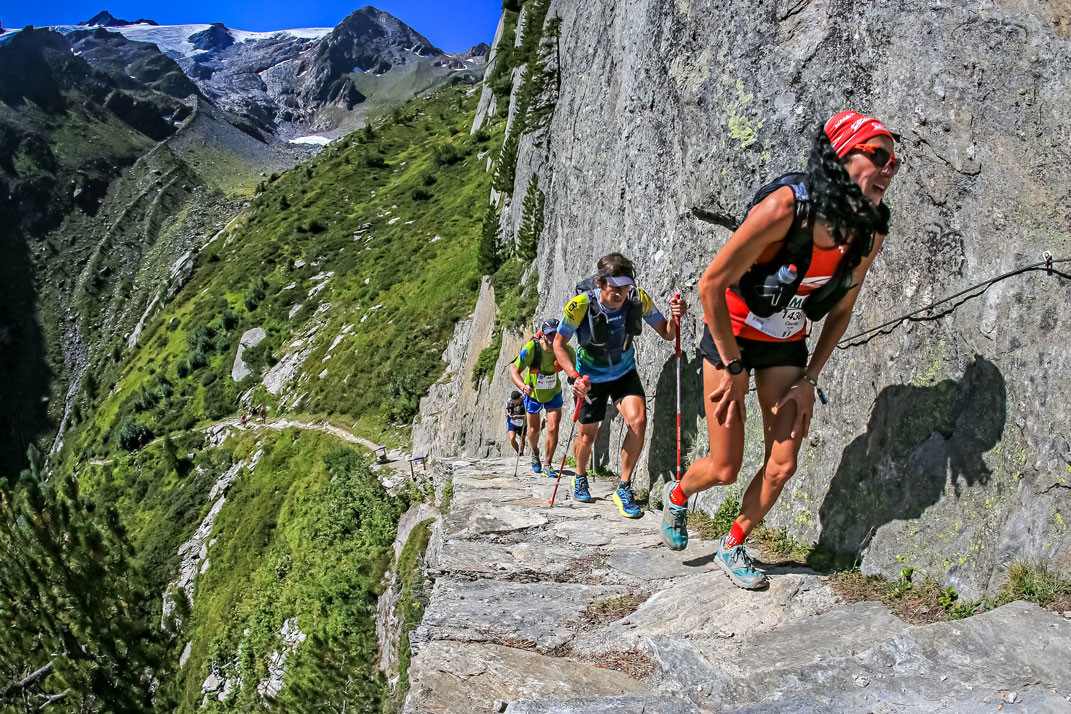
Former UTMB champs Courtney Dauwalter of the U.S. and Francesca Canepa of Italy headline the women’s race. Dauwalter is the reigning UTMB champion after her win in 2019, which was her first time running the race. She is widely recognized as one of the best ultrarunners on the planet, and she will be extremely tough to beat in Chamonix.
RELATED: UTMB adds to international race lineup with Thailand ultramarathon
Canepa won the women’s UTMB crown in 2018, and she also placed second in 2012. Other former top UTMB finishers on the start list for 2021 include Japan’s Kaori Niwa (fourth in 2017 and the winner of the 2019 Oman by UTMB 170K ultramarathon), Uxue Fraile Azpeitia of Spain (three-time UTMB podium finisher) and Beth Pascall of the U.K. (fourth- and fifth-place finishes in 2018 and 2019).
Multiple world record holder Camille Herron is also set to race in Chamonix. She has won ultramarathons around the world, including the Comrades Marathon in South Africa in 2017 and the Tarawera 100-miler in New Zealand in 2019, and she certainly has what it takes to win or place high in the overall UTMB standings.
Ailsa Macdonald is the lone Canadian in the elite UTMB women’s field. With big results like her wins at the Golden Ultra in B.C. in 2018 and the Tarawera 100 in 2020, Macdonald is another podium threat. She also has experience in Chamonix, having placed sixth in the UTMB’s CCC 101K ultra in 2019.
The men’s race
On the men’s side, there are four former UTMB winners: Pau Capell of Spain (winner in 2019) and French athletes François D’Haene (won in 2012, 2014 and 2017), Ludovic Pommeret (won in 2016) and Xavier Thévenard (won in 2013, 2015 and 2018). The past eight UTMB crowns belong to these four men, and they’re all capable of extending that streak to nine straight this year.
Jim Walmsley and Tim Tollefson are the top two American hopes on the men’s side. Tollefson made the UTMB podium in 2016 and 2017 with a pair of third-place finishes, while Walmsley has only raced in Chamonix once, running to fifth place. As Walmsley showed recently in a 100K world record attempt (he ran 6:09:26, missing the record by 12 seconds), he is in incredible shape this year, and while August is still months away, he has to be considered a favourite.
Also on the start list is the U.K.’s Damian Hall, who finished in fifth at the 2018 edition of UTMB. Hall is coming off a fantastic year of running that featured several prominent FKTs, and although he hasn’t raced in a while, he shouldn’t be counted out come August.
Finally, Canada will be represented by Mathieu Blanchard. Born in France, Blanchard now lives and trains in Montreal. He has raced in Chamonix before, running to a 13th-place finish in 2018, and in 2020 he ran onto the podium at the 102K Tarawera Ultra race.
UTMB is set to run from August 23 to 29, 2021.
by Running Magazine
Login to leave a comment
Six former UTMB champs are on the start lists for the famed ultramarathon's comeback in August
The 2021 edition of the Ultra-Trail du Mont-Blanc (UTMB) is still months away, but the fields for the August race are officially set. After UTMB organizers cancelled their event in 2020 due to COVID-19, any race would have been exciting to watch this year, but fans will be treated to a pair of stacked lineups in the men’s and women’s fields.
With six former UTMB champions and many other world-class runners set to race in Chamonix, France, later this year, the storied 170K ultramarathon looks like it will be can’t-miss action.
The women´s race
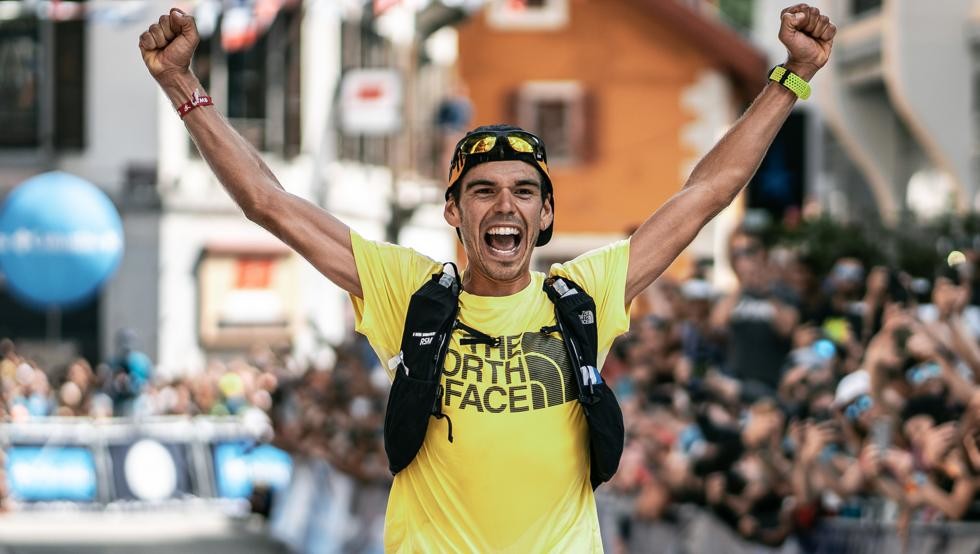
Former UTMB champs Courtney Dauwalter of the U.S. and Francesca Canepa of Italy headline the women’s race. Dauwalter is the reigning UTMB champion after her win in 2019, which was her first time running the race. She is widely recognized as one of the best ultrarunners on the planet, and she will be extremely tough to beat in Chamonix.
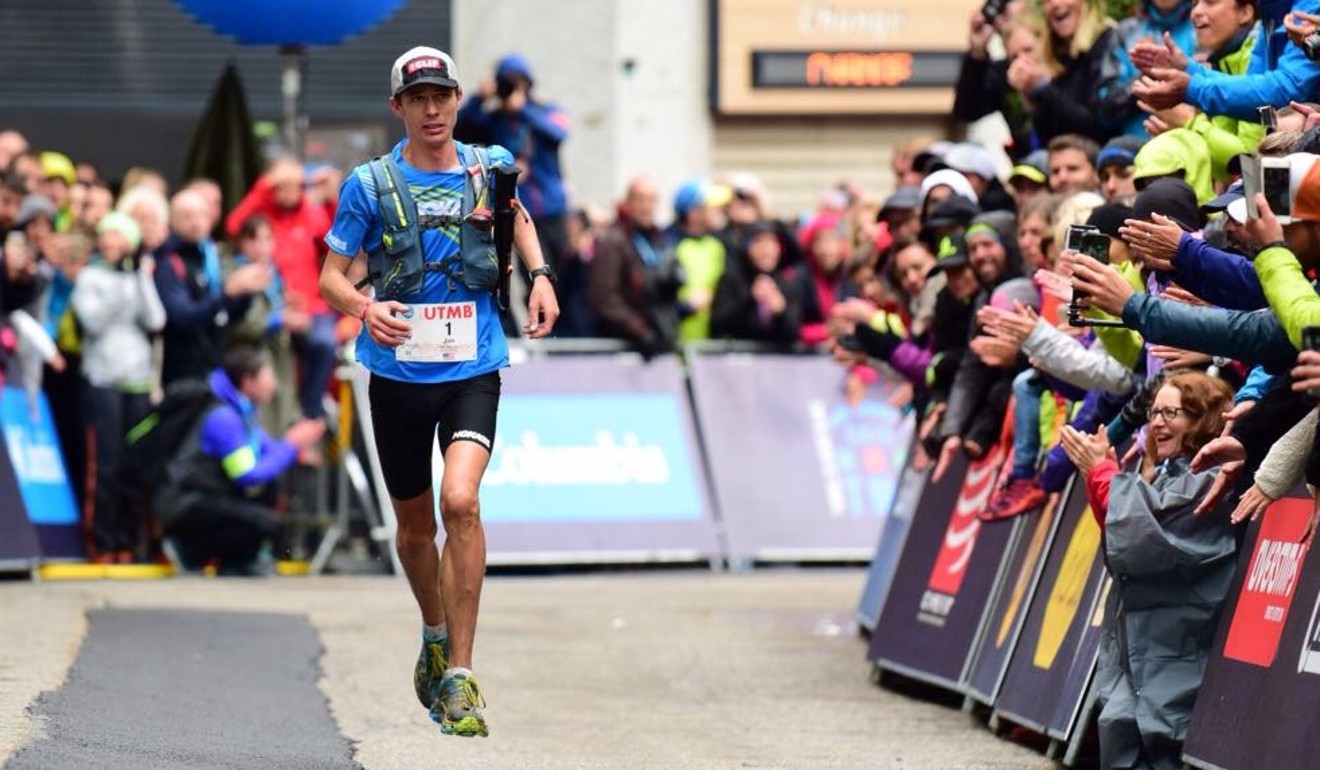
Canepa won the women’s UTMB crown in 2018, and she also placed second in 2012. Other former top UTMB finishers on the start list for 2021 include Japan’s Kaori Niwa (fourth in 2017 and the winner of the 2019 Oman by UTMB 170K ultramarathon), Uxue Fraile Azpeitia of Spain (three-time UTMB podium finisher) and Beth Pascall of the U.K. (fourth- and fifth-place finishes in 2018 and 2019).
Multiple world record holder Camille Herron is also set to race in Chamonix. She has won ultramarathons around the world, including the Comrades Marathon in South Africa in 2017 and the Tarawera 100-miler in New Zealand in 2019, and she certainly has what it takes to win or place high in the overall UTMB standings.
Alisa McDonald
Is the lone Canadian in the elite Camille Herron is also set to race in Chamonix. She has won ultramarathons around the world, including the Comrades Marathon in South Africa in 2017 and the Tarawera 100-miler in New Zealand in 2019, and she certainly has what it takes to win or place high in the overall UTMB standings.
The men’s race
On the men’s side, there are four former UTMB winners: Pau Capell of Spain (winner in 2019) and French athletes François D’Haene (won in 2012, 2014 and 2017), Ludovic Pommeret (won in 2016) and Xavier Thévenard (won in 2013, 2015 and 2018). The past eight UTMB crowns belong to these four men, and they’re all capable of extending that streak to nine straight this year.
Jim Walmsley and Tim Tollefson are the top two American hopes on the men’s side. Tollefson made the UTMB podium in 2016 and 2017 with a pair of third-place finishes, while Walmsley has only raced in Chamonix once, running to fifth place.
As Walmsley showed recently in a 100K world record attempt (he ran 6:09:26, missing the record by 12 seconds), he is in incredible shape this year, and while August is still months away, he has to be considered a favorite.
Also on the start list is the U.K.’s Damian Hall, who finished in fifth at the 2018 edition of UTMB. Hall is coming off a fantastic year of running that featured several prominent FKTs, and although he hasn’t raced in a while, he shouldn’t be counted out come August.
Finally, Canada will be represented by Mathieu Blanchard. Born in France, Blanchard now lives and trains in Montreal. He has raced in Chamonix before, running to a 13th-place finish in 2018, and in 2020 he ran onto the podium at the 102K Tarawera Ultra race.
by Ben Snider-McGrath
Login to leave a comment
North Face Ultra Trail du Tour du Mont-Blanc
Mountain race, with numerous passages in high altitude (>2500m), in difficult weather conditions (night, wind, cold, rain or snow), that needs a very good training, adapted equipment and a real capacity of personal autonomy. It is 6:00pm and we are more or less 2300 people sharing the same dream carefully prepared over many months. Despite the incredible difficulty, we feel...
more...The North Face Just Dropped the First Carbon-Plated Trail Running Shoe
Controversial speed is coming to a mountain near you
I’ve tested out carbon-plated shoes from a variety of running brands over the last 12 months. A movement that began with Nike’s NEXT% line — which propelled Kenyan legend Eliud Kipchoge to a mind-boggling sub-two hour marathon back in late 2019 — has now firmly taken over the sport.
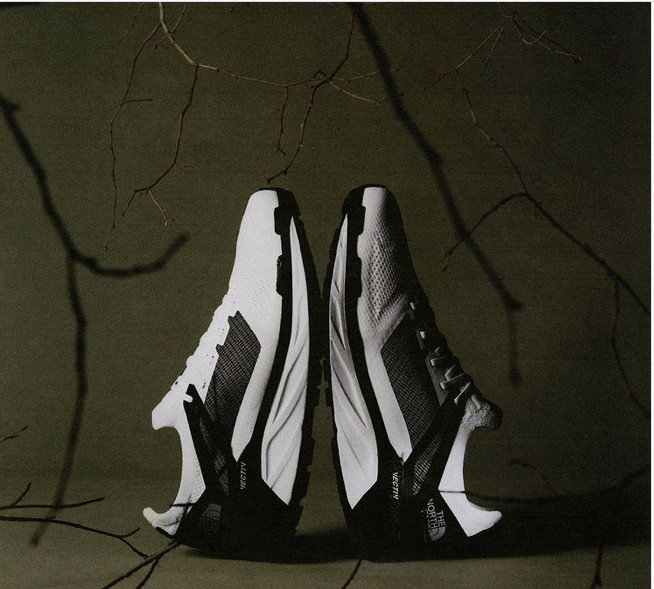
For the skeptics out there, these shoes are legit. There’s a reason the success of Nike’s shoe led to allegations of “gear doping,” new rules from the World Athletics body, and a call to arms for competitors like Adidas, ASICS and Saucony. The shoes generally combine tall, lightweight foam (which running journalist Amby Burfoot once compared to having extra leg muscles), with a carbon insert, meant to facilitate maximum energy retention — to “propel you froward” as the brand copywriters like to say.
After all that initial noise, they’re not only here to stay; they’re poised to take over other sub-sections of the sport. Yesterday, The North Face dropped a first look at its VECTIV series, the world of trail running’s first official carbon-plated running shoes.
I have zero complaints about my carbon-plated shoes. (Lately, I’ve been running in the Nike ZoomX Vaporfly NEXT%s and the Saucony Endorphin Pros.) In a year without races, they’ve helped me to log some benchmark times I’m proud of. That said, those shoes are noticeably reliant on dry, clean surfaces. They like asphalt, they prefer track. Whenever either is slick from rain or snow, or — god forbid — roots or leaves get involved, they have a ton of trouble gripping the ground.
The North Face, a brand as synonymous with all-elements gear as any on the planet, has designed a carbon-plated shoe that can actually handle unforgiving trails. Most running brands have their athletes come in and test out prototypes on a treadmill; TNF trail runners logged up to 600 miles in a single pair, and much of them on punishing terrain. One runner ran 93 miles around Mt. Rainier in them this past summer.
The premier release in TNF’s line, the FLIGHT VECTIV, aims for stability and strength, like any other reliable trail running shoe. It has a high-grip outsole, while its mesh fibers are literally reinforced with Kevlar. But it’s built for speed. The shoes contain a 3D plate directly underneath the foot, alongside a rocker midsole. Ultrarunner Pau Capell described the shoes as a “downhill weapon.” Trail runners often have to slow down due to practical concerns, not for lack of spirit. These shoes are designed to let them fly.
And, crucially, to avoid injury while doing so. The maximalist foam included in carbon-plated shoes blunts the impact of runners logging so many miles. Ultrarunners are on another level entirely; they’re incessantly susceptible to stress fractures, plantar fasciitis, sprained ankles, cramps, and broken toes. But the VECTIV line — which also includes the INFINITE and the ENDURIS, two shoes less concerned with speed — promises 10% less “impact shock.” It could bring more newcomers to the sport, and keep around those who already love it.
Login to leave a comment
2019 champion is running UTMB anyway
Spanish ultrarunner Pau Capell says he plans on running the 171K UTMB Mont-Blanc route even though the race is cancelled
On May 20, race organizers for the Ultra-Trail du Mont-Blanc announced that the 2020 edition was officially cancelled. The UTMB features seven events (all of which start in Chamonix every August), the most famous being the gruelling 171K ultra that takes runners through the Alps in France, Italy and Switzerland. Runners around the world were of course disappointed when the race was called off, no matter how inevitable that cancellation seemed to be. The men’s champion from 2019, Pau Capell of Spain, isn’t accepting the cancellation, and he has announced that he will be running the route on his own in late August.
Capell made this announcement soon after the UTMB was officially cancelled (just two days later), posting on Twitter and Instagram to say, “I will run UTMB! Alone, without a bib and with my support team.” He also posted that he plans to start the run at 6 p.m. on August 28, four days after the event was set to officially start.
There are many issues that could arise and ruin Capell’s plan, including potential travel restrictions and further lockdowns in his home country of Spain or in France. Both countries were under strict lockdowns for the past two months, and restrictions have only recently been loosened in each country. Many public health officials around the world have forecast a second wave of the coronavirus, so by August, Spain, France and the rest of the world could be back in lockdown, which would stop Capell from going.
There’s also the moral question of whether it’s OK to go and do this race when it’s been cancelled. UTMB organizers called the race off because it was the best way to keep everyone safe, and although Capell running on his own with a small support crew is much different than thousands of runners coming to race the UTMB events, it’s still a questionable decision.
Capell is an experienced ultrarunner, and he will undoubtedly come well prepared with enough supplies and a good crew, but there’s the possibility that people will follow in his footsteps and take on the UTMB solo as well. If this happens, it’s very possible that other runners won’t be as well prepared as Capell, and that could create issues for themselves and other runners around them.
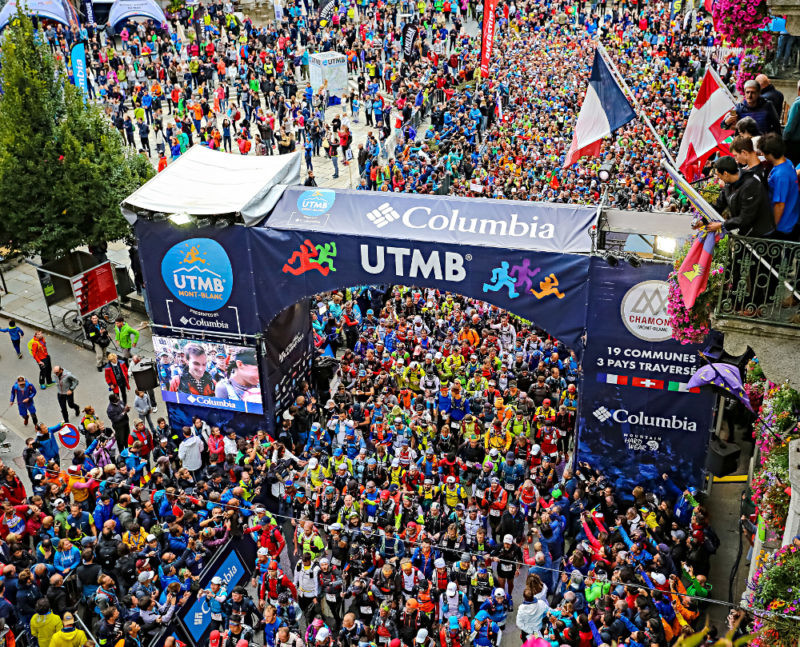
If Capell is able to go through with his solo run, it will be interesting to see how it goes. When he won the race in 2019, he covered the 171K course in 20:19:07. It’s hard to imagine that he could beat that time without the adrenaline shot delivered from a real race with cheering spectators and other competitors, but we’ll just have to wait and see what type of run he can produce if the time comes.
by Running Magazine
Login to leave a comment
Spanish ultrarunner Pau Capell says he plans on running the 171K UTMB Mont-Blanc route even though the race is cancelled
On May 20, race organizers for the Ultra-Trail du Mont-Blanc announced that the 2020 edition was officially cancelled. The UTMB features seven events (all of which start in Chamonix every August), the most famous being the gruelling 171K ultra that takes runners through the Alps in France, Italy and Switzerland.
Runners around the world were of course disappointed when the race was called off, no matter how inevitable that cancellation seemed to be. The men’s champion from 2019, Pau Capell of Spain, isn’t accepting the cancellation, and he has announced that he will be running the route on his own in late August.
Capell made this announcement soon after the UTMB was officially cancelled (just two days later), posting on Twitter and Instagram to say, “I will run UTMB! Alone, without a bib and with my support team.” He also posted that he plans to start the run at 6 p.m. on August 28, four days after the event was set to officially start.
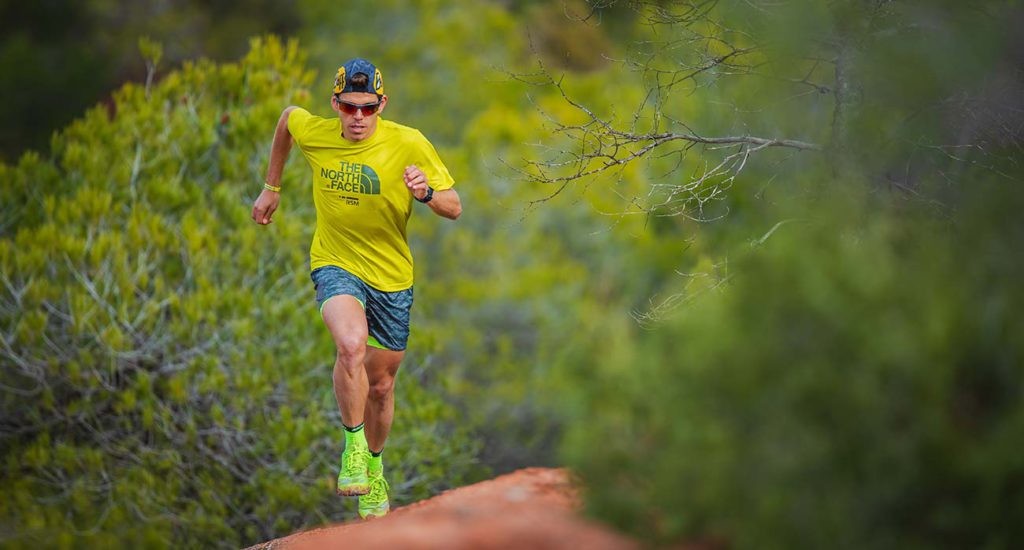
There are many issues that could arise and ruin Capell’s plan, including potential travel restrictions and further lockdowns in his home country of Spain or in France. Both countries were under strict lockdowns for the past two months, and restrictions have only recently been loosened in each country.
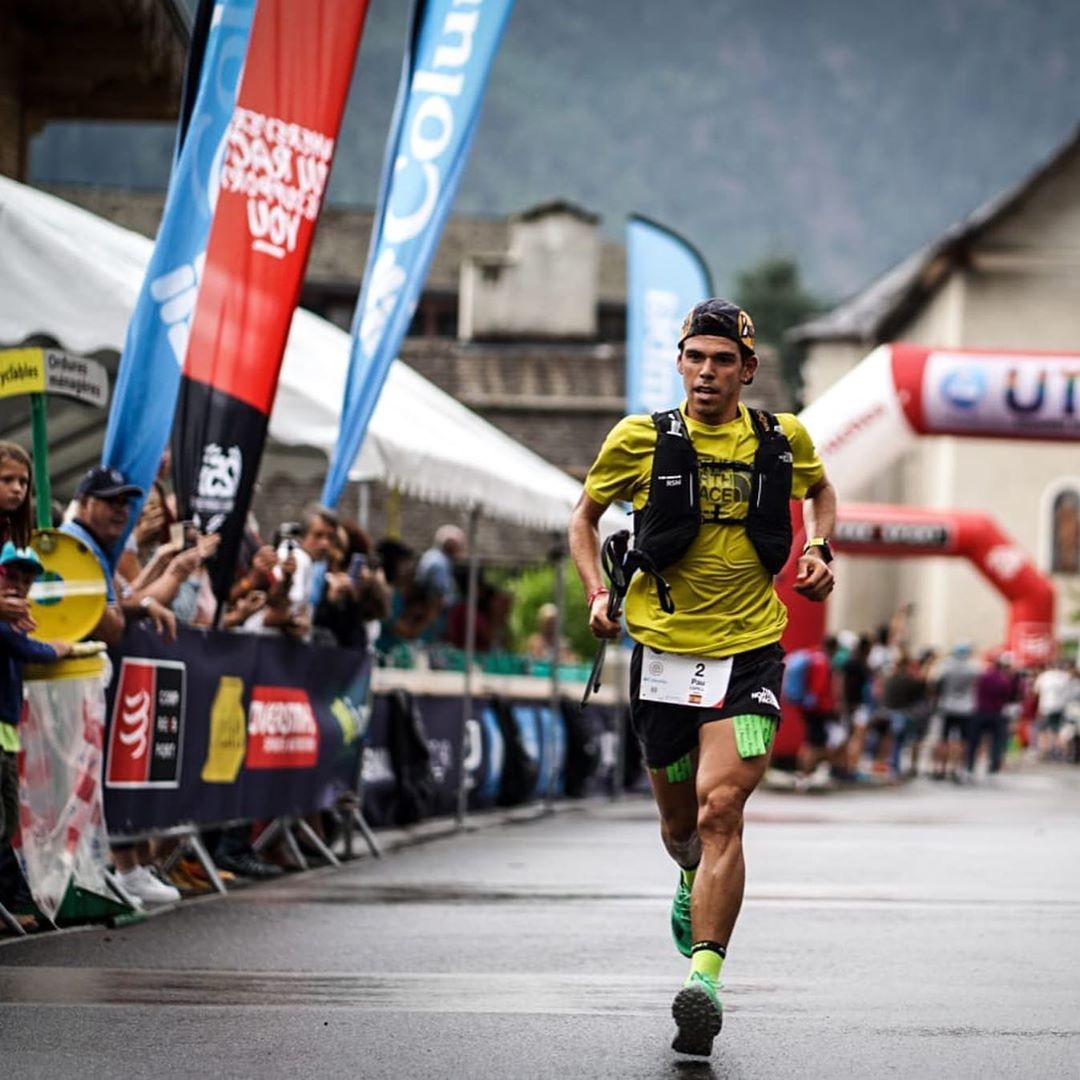
Many public health officials around the world have forecast a second wave of the coronavirus, so by August, Spain, France and the rest of the world could be back in lockdown, which would stop Capell from going.
There’s also the moral question of whether it’s OK to go and do this race when it’s been cancelled. UTMB organizers called the race off because it was the best way to keep everyone safe, and although Capell running on his own with a small support crew is much different than thousands of runners coming to race the UTMB events, it’s still a questionable decision.
Capell is an experienced ultrarunner, and he will undoubtedly come well prepared with enough supplies and a good crew, but there’s the possibility that people will follow in his footsteps and take on the UTMB solo as well. If this happens, it’s very possible that other runners won’t be as well prepared as Capell, and that could create issues for themselves and other runners around them.
If Capell is able to go through with his solo run, it will be interesting to see how it goes. When he won the race in 2019, he covered the 171K course in 20:19:07. It’s hard to imagine that he could beat that time without the adrenaline shot delivered from a real race with cheering spectators and other competitors, but we’ll just have to wait and see what type of run he can produce if the time comes.
by Ben Snider-McGrath
Login to leave a comment
North Face Ultra Trail du Tour du Mont-Blanc
Mountain race, with numerous passages in high altitude (>2500m), in difficult weather conditions (night, wind, cold, rain or snow), that needs a very good training, adapted equipment and a real capacity of personal autonomy. It is 6:00pm and we are more or less 2300 people sharing the same dream carefully prepared over many months. Despite the incredible difficulty, we feel...
more...Pau Capell aggressive tactics pay off as he becomes first non-French winner since Kilian Jornet to win UTMB
Pau Capell won the Ultra Trail du Mont Blanc (UTMB) in 20 hours, 19 minutes and seven seconds. He is the first non-French winner since his fellow Spaniard Kilian Jornet won in 2011.
The UTMB is one of the premier ultra trail races in the world. It is the culmination of a week long running festival, which sees the best in the sport compete for the coveted winners titles.
The brutal 171km course, with over 10,000 meters of accumulative elevation, favors runners who pace themselves conservatively – a common refrain is that “the race does not start until 100km”. But, Capell ignored the advice and set off at an aggressive pace, taking the lead in the first few kilometres and holing it until he ultimately won.
“Leading from wire to wire, in heroic fashion, it goes against common sense in endurance sport and everything you would expect given the field,” said UTMB commentator Dylan Bowman, who finished second in the 145km TDS at the UTMB week in 2018.
Bowman added it shows the sport is evolving, and to win at the top level, you now need to take risks.
Finish line announcer Eoin Flynn listed Capell’s other wins and compared him to a superhero.
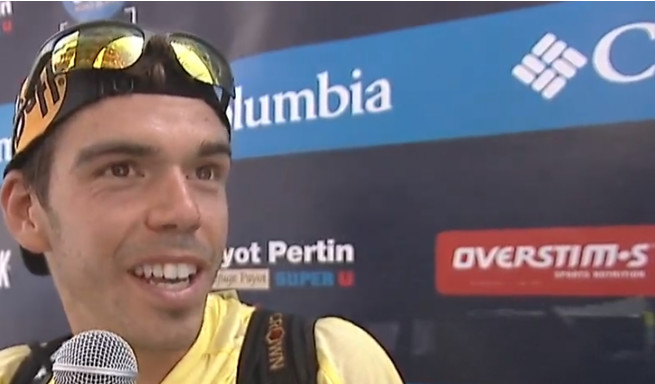
‘I felt horrible’: Ruth Croft reflects on OCC win at UTMB
Capell modestly said “I’m not a superhero but if one did exists it would be my parents.”
The race started in Chamonix, 6pm, on Friday. A few Chinese athletes set off at a mad speed. In particular, HK100 2018 champion Qi Min looked like he was trying to set his 5km personal best, rather than run for almost a day. Qi looked over his shoulder and saw the lead he had built in the first few hundred meters and slowed until Capell was level with him. The pair stuck together, but Qi began to fade from the top five. Between 80km and 100km he dropped out of the top five and then out of the top 100.
The pack began to set and it looked as though the podium was decided well before the finishing line. Capell had an unassailable lead over three time champion and eventual second place Xavier Thevenard (21:07:56), who himself was well ahead of third place New Zealander Scotty Hawker (21:48:04).
Audrey Tanguy wins TDS, Hillary Allen marks comeback from near-fatal fall
“What to say about Pau? He did a great race today. I saw the time, it got 10 minutes farther and 10 minutes farther,” Thevenard said. “He was untouchable.”
Thevenard used his time in the limelight to call people to protect the environment for future generations.
Hawker crossed the finish line, running hand in hand with his young daughter, mirroring scenes at the HK100 when she sang Happy Birthday.
“It’s a dream come true,” Hawker said of reaching the podium at the UTMB. “I thought maybe one day, but it was just a dream, now it’s real.”
Hawker was in the leading group along with Capell at the start of the race.
“At the start, it may have looked fast but it was honestly slower than other years,” he said.
A tearful Hawker said as he ran he thinking of his parents watching at home and his family at the finish line.
Login to leave a comment
North Face Ultra Trail du Tour du Mont-Blanc
Mountain race, with numerous passages in high altitude (>2500m), in difficult weather conditions (night, wind, cold, rain or snow), that needs a very good training, adapted equipment and a real capacity of personal autonomy. It is 6:00pm and we are more or less 2300 people sharing the same dream carefully prepared over many months. Despite the incredible difficulty, we feel...
more...

